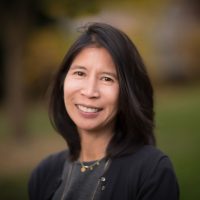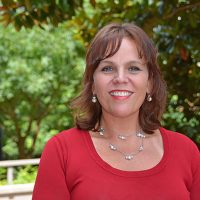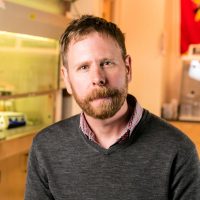Global Health is Local Public Health
Faculty Global to Local Spotlight
We spotlight several global faculty members who are engaged in this space.
Vivian Go, PhD, professor of health behavior
Dr. Go has worked for over 20 years on HIV prevention and care interventions for marginalized populations, including persons who inject drugs in Vietnam. Recently, she has started working in Appalachian Ohio conducting research to describe drug use patterns and to address health service gaps for people with opioid use disorders.
She says the research similarities between the two seemingly disparate settings were significant. Work in Vietnam and in rural Ohio had to start with the careful process of building rapport in communities with a pervasive distrust of outsiders. The team used a mixed methods approach to work closely with key community stakeholders to understand the historical, social and cultural context of opioid use. They drew from their experiences in Vietnam to bring a range of voices around the table to discuss highly charged topics such as harm reduction approaches.
Dr. Go believes the team’s work in Vietnam and Ohio highlights the interconnectedness of local-global research:
“To me, global-local means that global can be right at your doorstep; that the exchange of ideas and research experiences can flow in all directions from local to international, international to local, local to local and international to international. It’s not a division of local versus global but rather a holistic approach.”
Stephanie L. Martin, PhD, assistant professor of nutrition
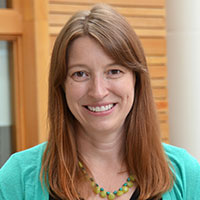
Dr. Stephanie Martin
A practitioner working on programs to improve nutrition during pregnancy and early childhood, Dr. Martin has global experience working in Kenya, Tanzania, Ethiopia, and Lesotho. Now as a Gillings faculty member, she conducts nutrition research in Kenya and Tanzania and works in partnership with UNC Global Project Zambia on two studies. In Kenya and Zambia, she has conducted implementation research with community health workers and peer educators to understand their motivation and experiences supporting families to improve child nutrition.
Closer to home, Dr. Martin has brought her many years of experience in Africa to explore some of these same issues. Through partnerships with the Appalachian Breastfeeding Network and the North Carolina State WIC Program (Special Supplemental Nutrition Program for Women, Infants, and Children) she is studying the experiences of lactation professionals and breastfeeding peer counselors. Dr. Martin says she sees many of the same issues in rural Appalachia and rural parts of East and Southern Africa with limited access to services for lactation support, and similar efforts are needed to helping every parent have access to the support they deserve to reach their infant feeding goals. Her applied research seeks to improve the impact of regional nutrition programs.
Kari North, PhD, professor of epidemiology
Dr. North’s current work involves a project centered on the illusory border between global and local Global Health work. She’s been involved in a project in South Texas that has been hit very hard by COVID-19. The disparities in COVID infection rates have been substantial in this region, with the Mexican-American population being hit especially hard. Dr. North is working through her collaboration on the Cameron County Hispanic Cohort (CCHC), which has an alarmingly high rate of diabetes, obesity, and other underlying health issues.
Working across national borders to survey local communities, they have collected data on symptoms, medical records, whole blood RNA and plasma, and antibody profiles to determine SARS-CoV-2 exposure in CCHC participants. They have used new RNA from individuals that were infected with COVID-19 and compared it to the RNA of these same individuals before they got sick to assess changes in gene expression associated with COVID-19 infection and severity using longitudinal RNA sequencing data. This study will help them understand both genetic susceptibility to COVID-19 infection and to severe disease, supporting better health outcomes both internationally and domestically.
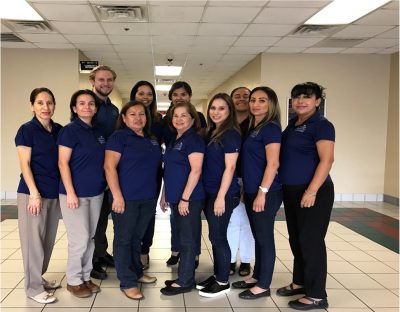
The team
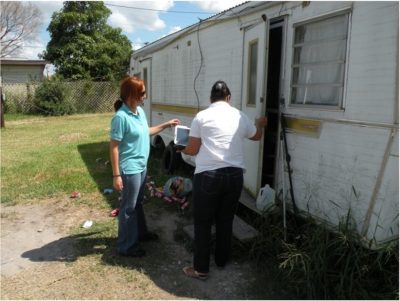
Out surveying the local community.
Joe Brown, PhD, PE, associate professor of environmental sciences and engineering
Dr. Brown’s work is focused on environmental quality and human health. He is interested in low-cost water treatment, sanitation, and the role of infrastructure in protecting global public health. A majority of his work is international. Among other activities, he leads large health impact trials of water, sanitation, and hygiene (WASH) interventions in Mozambique, Cambodia, India, and Bolivia, together with local partners. His work in this space has been funded by the Bill and Melinda Gates Foundation, USAID, NSF, and others.
More locally, Dr. Brown researches sanitation and health in the Black Belt of Alabama—he was born and raised in Selma—where he is working with CDC funding to look at soil transmitted helminths and other enteric pathogen exposures affecting underserved communities, together with UAB and other partners in Alabama. He has also worked on microbial exposure among people experiencing homelessness. Dr. Brown says the differences between work in low-income communities of the US and the international sites he works with are in degree and not kind: gaps in infrastructure in economically rich countries affect poorer and marginalized communities, and inequities are on the rise. People lack basic WASH infrastructure, like adequate sanitation, in rural America as well as in low-income countries abroad.

